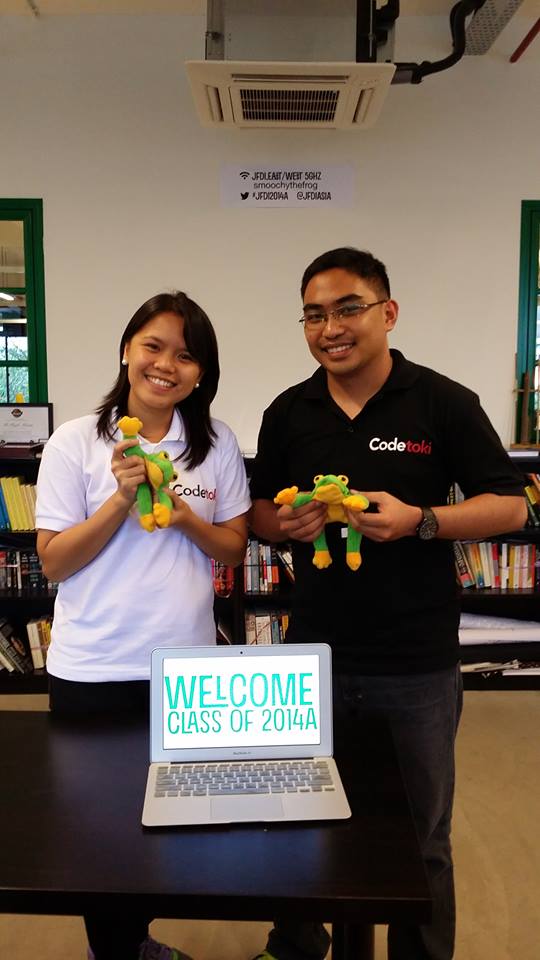Let’s face it: Most of us in the Philippines want to be entrepreneurs, but many of us don’t know where or how to begin. Some assume you have to attend business school and others think you need to find investors first.
I’m here to suggest another route to owning your own business: freelancing. In fact, I would recommend freelancing over other paths to entrepreneurship, including working as a full-time employee.
How a Freelancer Became a CEO: Ademar Tutor of Codetoki
Don’t believe me? Take the example of Cebuano, Ademar Tutor. He is the co-founder and CEO of Codetoki, which is now being incubated at one of the top accelerators in Asia in JDFI Asia.
Like many Filipinos, Ademar worked as a freelancer online, primarily through the oDesk marketplace. His specialty was web development.
He would bid on web development projects that companies abroad posted on oDesk. Winning a bid was initially tough, no doubt – there were many other freelancers, all vying for the same position – but in time he was able to win his first project.
With that project, Ademar – like most freelancers just starting out – spent more time on it than he had initially expected. But as he got more jobs, he came to better understand what kind of skills and work it would take to successfully complete a project based on what a prospective client posted about it.
While developing his online work portfolio, Ademar came to understand that online freelancing is hard work—it takes dedication and time management, and requires ongoing skill development to stay relevant. You really have to put in quite a bit of upfront work in order to succeed. You’ll have your ups (periods with plenty of work) and your downs (periods with less work) but so long as you deliver quality work and meet your client’s expectations, you will see positive results.
As with Ademar, what will help you prosper through it all is persistence. Whenever you see a project that matches your skills, you should send in a thoughtful proposal, which includes relevant work history and ideally prepare a proposed timeline.
Yes, even with a well-thought-out proposal, you will still get your fair share of rejections. Ademar sure did. But – and this is a big but – you will get many more job offers. What will carry you through the cyclical nature of online freelancing is your own sense of time management as well as financial management.
Ademar, for his part, built strong relationships with his clients, primarily through his skills as a developer, but also through his communication abilities. When working with companies abroad, you need to always keep them updated on your progress.
Eventually, those clients recommended Ademar to other companies, and soon word got around that he was a great developer to work with. Ademar soon had saved a decent sum of money, especially as he was earning in dollars rather than in pesos.
As would have been the temptation for anyone in his position, it would have been easy to settle. He could have bought a car, a house, or other luxuries that show you’ve made it in the Philippines. Instead, he reinvested the bulk of his earnings into a company that he had always dreamed of building: Codetoki.
To put it simply, Codetoki aims to “gamify” web development, so more Filipinos – especially those who may not have considered themselves “technical people” before – can learn the trade. Users can solve coding challenges, get badges, and earn points.
In this way, Ademar hopes to use Codetoki to uplift the tech industry in the Philippines, and he is already well on his way there. As I mentioned previously, Codetoki was recently accepted into one of the top accelerators in Asia, JDFI Asia. They will provide him with the mentorship, resources, and funding he needs to take Codetoki to the next level.
I shared Ademar’s story because I want more Filipinos to have their own success stories like his. I think it is well within most Filipinos reach, especially if they consider freelancing, such as through oDesk or Elance. To succeed on these platforms, they should heed this advice:
- You need to understand that with bidding on a project comes rejection. Every freelancer goes through it, and it’s how you respond that determines whether you will be successful. You need to stay persistent in bidding on projects that are tailored to you, and you should show this through well-thought out proposals.
- Between bidding on new projects and successfully completing the ones you have, you will need to master the delicate art of time management. Understanding how long a project will take to complete will help you deliver on time and exceed the client’s expectations.
- Just as important as time management is financial management. Because the very nature of online freelancing means that work ebbs and flows, you need to prepare for the long haul. You should make sure to save a good chunk of your earnings, so you’re never reliant on the next payday to pay for your groceries.
So what are you waiting for? If you have the determination it takes to succeed as a freelancer, you will have – like Ademar – all the skills it takes to succeed as an entrepreneur.
By Ron Cirujano






